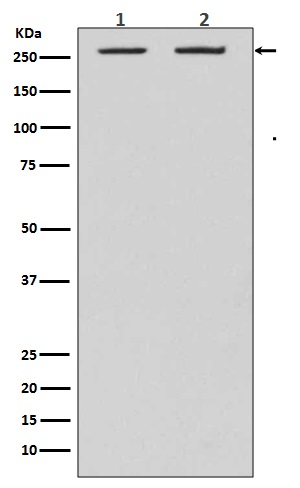
| WB | 咨询技术 | Human,Mouse,Rat |
| IF | 咨询技术 | Human,Mouse,Rat |
| IHC | IHC:1/100-1/200;IHF:1/50-1/200 | Human,Mouse,Rat |
| ICC | 1/50-1/200 | Human,Mouse,Rat |
| FCM | 咨询技术 | Human,Mouse,Rat |
| Elisa | 咨询技术 | Human,Mouse,Rat |
| Aliases | ACAC; ACACA; ACC alpha; ACC1; ACCA; Acetyl Coenzyme A; Biotin carboxylase;;Acetyl CoA carboxylase 1 |
| WB Predicted band size | Calculated MW: 266 kDa ; Observed MW: 265 kDa |
| Host/Isotype | Rabbit IgG |
| Antibody Type | Primary antibody |
| Storage | Store at 4°C short term. Aliquot and store at -20°C long term. Avoid freeze/thaw cycles. |
| Species Reactivity | Human |
| Immunogen | A synthesized peptide derived from human Acetyl CoA carboxylase 1 |
| Formulation | Purified antibody in PBS with 0.05% sodium azide,0.05% BSA and 50% glycerol. |
+ +
以下是关于Acetyl-CoA Carboxylase(ACC)抗体的3篇文献摘要示例:
---
1. **文献名称**: *"Production and characterization of monoclonal antibodies against human acetyl-CoA carboxylase"*
**作者**: Thampy, K.G., & Wakil, S.J. (1988)
**摘要**: 该研究制备了针对人源ACC的单克隆抗体,验证了其特异性并应用于检测不同组织中的ACC亚型(ACC1和ACC2),揭示了其在哺乳动物脂质代谢研究中的潜在应用价值。
2. **文献名称**: *"Acetyl-CoA carboxylase phosphorylation regulates mitochondrial lipid metabolism in a mouse model of metabolic syndrome"*
**作者**: Fullerton, M.D., et al. (2013)
**摘要**: 通过特异性ACC抗体分析磷酸化位点,研究揭示了ACC在代谢综合征模型小鼠中的调控机制,发现其磷酸化状态与线粒体脂肪酸氧化及胰岛素抵抗密切相关。
3. **文献名称**: *"Immunological analysis of acetyl-CoA carboxylase in Arabidopsis thaliana: Insights into plant lipid biosynthesis"*
**作者**: Sasaki, Y., & Nagano, Y. (2004)
**摘要**: 利用ACC抗体研究拟南芥中ACC的亚细胞定位及表达模式,证实其在植物油脂合成中的关键作用,并发现环境因素(如光照)对ACC蛋白水平的调控。
---
注:以上文献为示例性质,实际引用时需核对具体来源及期刊信息。
Acetyl-CoA carboxylase (ACC) is a biotin-dependent enzyme that catalyzes the carboxylation of acetyl-CoA to malonyl-CoA, a critical rate-limiting step in fatty acid synthesis and regulation. It exists in two isoforms: ACC1 (cytosolic) and ACC2 (mitochondrial), which regulate lipid synthesis and oxidation, respectively. Dysregulation of ACC activity is linked to metabolic disorders (e.g., obesity, diabetes) and cancers, making it a therapeutic target.
ACC antibodies are immunodetection tools used to study ACC expression, phosphorylation, and subcellular localization in metabolic research. In clinical contexts, autoantibodies targeting ACC (anti-ACC antibodies) are associated with autoimmune hepatitis (AIH), particularly type 1 AIH. These autoantibodies, often detected via immunoassays, are part of the diagnostic workup alongside other markers (e.g., anti-SLA/LP antibodies). Their presence correlates with disease activity and may inform prognosis.
Research-grade ACC antibodies (monoclonal/polyclonal) are widely utilized in Western blotting, immunohistochemistry, and functional inhibition studies to explore ACC's role in cellular metabolism and disease mechanisms. Recent drug development efforts targeting ACC for metabolic syndrome or cancer therapy have further driven the demand for specific, high-affinity ACC antibodies to assess target engagement and therapeutic efficacy.
×